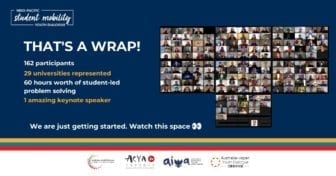Travelling as part of your degree is one of the absolute highlights of university. You can immerse yourself in a new culture, new food, and make new memories, all while gaining a valuable global perspective on life (plus it looks great on a resume).
It’s no secret that Covid-19 has thrown international travel out the window. Travel restrictions mean student mobility programs offered by Curtin and universities across Australia, like short term internships and student exchange, are currently not an option.
The ASEAN-Australian Strategic Youth Partnership (AASYP) recognised the many challenges faced by students wanting to pursue international travel as part of their studies and hosted the 2020 Indo-Pacific Student Mobility Youth Dialogue to get the ball rolling on how we can solve these issues.
On 26th August, 162 delegates from across Australia gathered (via Zoom, of course) to explore the future of student mobility. All delegates involved had participated in an international travel program at some point during their university studies, to countries like China, Japan, Sri Lanka, USA, South Africa, Scotland, and Myanmar. I was fortunate enough to go on a Curtin Go Global trip to India in December 2019 before the pandemic hit, and like many other delegates, am now a passionate advocate for student travel!
The night began with an insightful presentation by keynote speaker, Professor Ly Tran (PhD) from Deakin University’s School of Education, discussing her research on the internationalisation of education and trends in student travel. It was interesting to learn that 1 in 4 Australian undergraduate students embarked on global learning experiences in 2018 and student travel has increased more than threefold over the past 10 years! Professor Tran also delivered some excellent points on the personal benefits of student travel programs, such as increased employability, reciprocal learning, and an overall sense of gratefulness and appreciation for the opportunities and privilege we have here in Australia.
The main student dialogue focussed on some key topics related to what student travel might look like in the future, such as whether or not travel experiences could be replicated online, and how we could utilise technology to improve student mobility in the future. One of the many innovative ideas suggested by a delegate involved using virtual reality to allow students to have a real-time cultural immersion experience – imagine walking through a university campus in Tokyo with a local student host by your side to guide you, without even having to leave Perth!
Other common challenges faced by students on mobility programs were also discussed at the dialogue and included topics such as mental health, physical and psychological safety, culture shock, sexual health, support for LGBTQI+ students, religion, language, and personal finance. It was an amazing opportunity to hear delegates share their personal travel journeys, and how the challenges we discussed had affected their own mobility experiences.
The findings and solutions presented during the dialogue are currently being collated by participating delegates and facilitators into a post-event report, which will be used in the next stage of the event when AASYP hosts a series of roundtables with key stakeholders. For more information on the results of the Indo-Pacific Student Mobility Youth Dialogue, or to get involved in future AASYP events, head to the AASYP website.

Written by fourth-year occupational therapy honours student Audrie Tang
New Colombo Plan (NCP) Grant Recipient 2019
IPSMYD Delegate 2020


